It’s not uncommon to browse social media and see someone preparing food at home for their beloved pets. For me, the attraction of these posts is not the food in question, but rather how I almost always see comments indicating the time it takes to prepare such food for their pet day -day.
Having recently been on a meal plan for myself (prepared by a licensed doctor and nutritionist, of course), I often find myself doing a great meal prep on the weekend. It makes the task of figuring out what to eat every day so easy for me. This makes me more likely to stick to my meal plan.
While cooking my weekly weekend meals, I happened to have a request from my client to offer her a very low-carbohydrate recipe that would work for her cat from Monday to Friday, without her having to prepare meals every night. This is understandable, because we all know how noisy our pet cats are when they are not fed on time! Her cat Ivy prefers chicken. So, I made a recipe for Ivy that will last her a whole week!


Recipe of the Week – Low-Carb Chicken
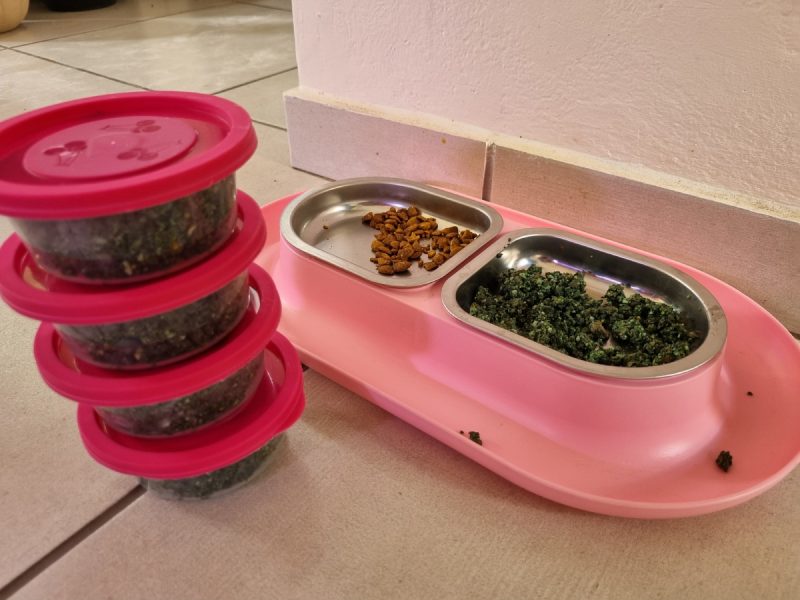
Important!
This is a complete and balanced recipe made for a cat for whom I have had a complete medical and nutritional history. It is considered complete and balanced for that cat only.
This recipe is safe for all healthy adult cats, but it may or may not be complete for your cat. Because of this, it is very important to review each recipe with a veterinary nutritionist before offering it to your cat.
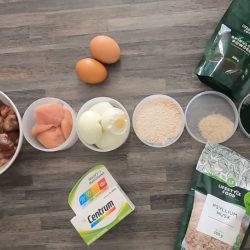
Homemade Low-Carb Chicken Cat Food Recipe
Preparing meals for your cat doesn’t have to be a busy day in the kitchen. You can prepare this delicious low-carb chicken recipe on the weekend, ensuring that your cat enjoys healthy meals throughout the week.
- 328.5 g – 11.06 oz Chicken hearts
- 132 g – 4.7 oz Chicken eggs (whole) (about 3-4 medium-sized eggs)
- 65.7 g – 2.3 oz Chicken breast (skinless, boneless)
- 6.57 g – 0.23 oz Adult Multivitamin/Multimineral (Brand: Centrum)
- 6.57 g – 0.23 oz Spirulina Powder
- 1.65 g – 0.06 oz Psyllium Husk Powder
-
Preparation:
-
Start by adding water to a pot large enough to boil the eggs and bring this water to a boil.
-
With the water boiling, add your eggs to the water. Boil the eggs until cooked (about 4-5 minutes on high heat).
-
Remove the hardboiled eggs from the water and let cool. Important: weigh the eggs when they are peeled to make sure they meet the requirements of the recipe!
-
In another pot or saucepan, bring some water to high heat – about 165 °F (73.9 °C). Make sure this pot or saucepan has a lid.
-
Cut the chicken breast into pieces about the size of the chicken’s heart.
-
Add the chicken hearts and chicken breast pieces to this second pot and put the lid on.
-
Cook the chicken breasts and hearts for the minimum amount of time it takes to cook them through (usually about 3-4 minutes).
-
Once cooked, turn off the stove and remove the pan from the heat source. Gently scoop the hearts and breast pieces out of the water and transfer them to another bowl. Allow them to cool. Important: weigh the meat to make sure it matches the requirements for the recipe!
-
With all 3 ingredients cooked (egg, heart, and breast), chop, chop, slice, or dice all ingredients into equal-sized portions (depending on your cat’s preference).
-
Finely grind the multivitamin/multimineral supplement into a powder (hint: a food processor works great for this step!).
-
Add the spirulina powder, psyllium husk, and the powdered multivitamin/multimineral supplement to the bowl containing the other cooked ingredients. Make sure you sprinkle them evenly over the food. (Tip: If your cat prefers chopped food, you can chop all the cooked ingredients in a food processor with powders and supplements!)
-
Divide the final mixture into food-sized portions for your cat.
-
Enjoy!


Basic Nutrition Information
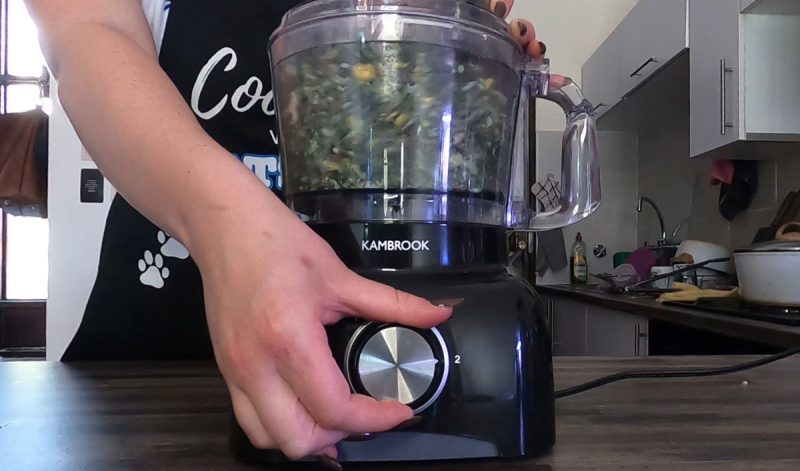
| Macronutrients | As Outlined | Dry Matter | % kcal |
| protein | 16.08 % | 57.50 % | 44.42 % |
| fat | 8.64 % | 30.90 % | 53.71 % |
| humidity | 72.04 % | – | – |
| Carbohydrates | 0.68 % | 2.42 % | 1.87% |
| Fiber | 0.35 % | 1.26 % | – |
- Total recipe weight (grams): 500
- Total recipe weight (oz): 17.6
- Number of days: 5
- Total kcal in the recipe: 783.36
- Kcal per gram: 1.45
- Kcal per oz: 41.05
- My client’s cat’s nutritional needs each day: 156.58
- Amount of feeding per day (grams): 108.14 g
- Amount of feeding per day (oz): 3.81 oz


Parts and Storage
Cooked or raw recipes can be stored in the refrigerator for up to 72 hours (3 days). Food intended for periods after this should be portioned and frozen; it will remain viable for consumption for up to 3 months in the freezer. It should be thawed slowly the night before offering it to your pet. Thawed food should not be refrozen.
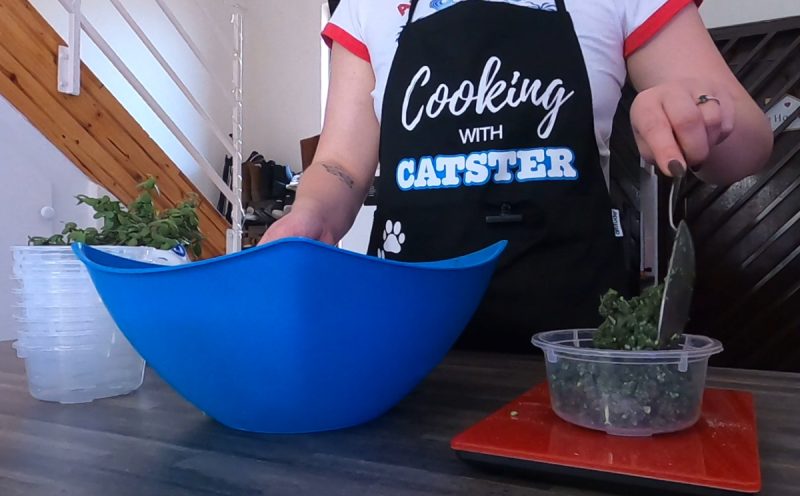
Upgrades (Optional)
Although my client requested a low carbohydrate option, I informed her that it is possible to add another carbohydrate source for fiber to this diet if she wanted to. Although not essential for a cat, fiber can offer them some health benefits (provided it is offered in reasonable amounts). In this case, I felt that a small amount of gently cooked carrots (about 65.7 grams) was a good idea. Ivy, however, had different ideas and didn’t appreciate carrots, so we decided to remove them.
In addition, my client was keen on an omega-3 fish oil for the recipe. Although acceptable in small amounts (about 3 grams for this entire recipe), it is important to note that any omega-3 or fish oils should only be added to a recipe when it is served to your pet Because of this, I cautioned him against adding it to the base recipe.
Leftover Ideas – “Mini” Hydration Treats
Another option in this recipe is to use the leftover water (in which the chicken hearts and breasts were cooked). Pour it into an ice-cube tray and freeze the water. The resulting ice cubes are a “protein” infused treat that you can melt and add to your cat’s meals as a means of additional hydration!
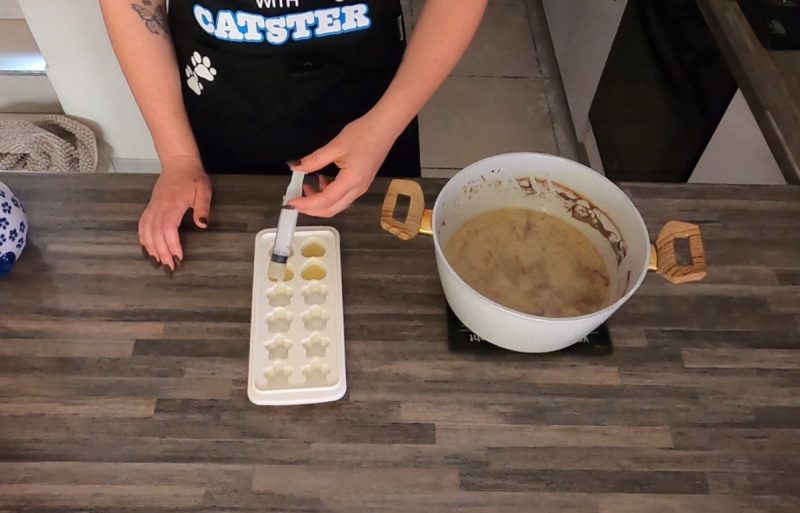
Spotlight Ingredient – It’s All in the Heart!
For most cat diets, nutritionists try to aim for a diet that consists of about 60-80% meat, fish, and eggs. Organs should generally only comprise about 10-30% of a diet. However, the heart is an exception to this rule.
Although an organ, the heart is a specialized muscle and does not need to be sacrificed in a restricted amount. In fact, it’s one of the best sources of taurine (an essential amino acid for cats), which is why this recipe features so much of this ingredient.
As far as organs (liver, gizzards, etc.) are concerned, the heart remains one of my absolute favorites for cats (and also for dogs). I particularly enjoy using chicken hearts because their size makes them very easy and easy to share for a diet. They also often end up being cheaper than other parts of the chicken carcass and are therefore a more economical option.


Conclusion
Preparing meals for cats does not have to be a daily tedious process in the kitchen. In fact, it’s possible to make a lot of food for your pet in one cooking session – enough to last for days!
I hope this recipe helps highlight the point that even though homemade diets take some time and effort, there are still many ways you can make the process easier for yourself.


